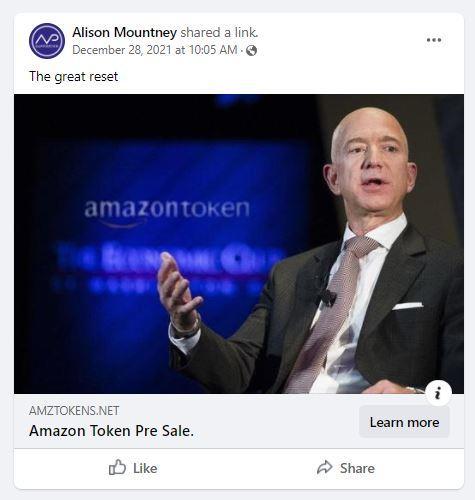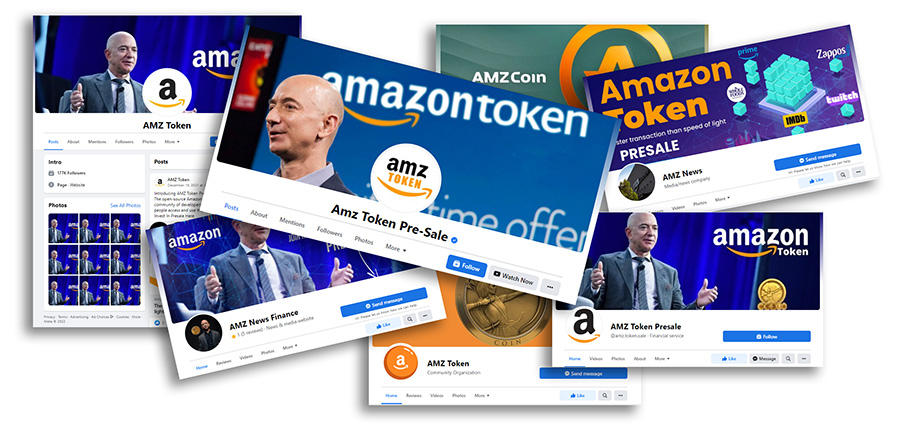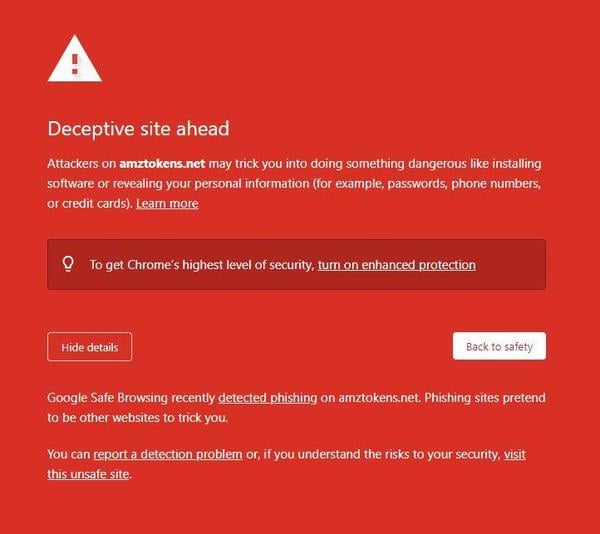
Did Amazon launch a presale of a new Amazon Token cryptocurrency -- and does the purchase of this cryptocurrency also include Amazon Prime and other member benefits? No, that's not true: A series of spoof websites impersonating both Amazon and media outlets reporting about this fictional cryptocurrency are based on empty promises from bogus websites. People who fall for this scam think they are investing in an Amazon product, instead they transfer their own cryptocurrency to an unknown entity and get nothing in return. In the process they may expose their other accounts and passwords to misuse. Amazon does not have any cryptocurrency offering, and is not offering any Prime promotions in connection with cryptocurrency. All of these are a scam.
This scam appeared in the summer of 2021 after Amazon published a job posting seeking to hire a digital currency and blockchain expert. This started rumors about what Amazon might have in the works. Scammers spun up convincing spoof websites to capitalize on the excitement and plausibility the job listing generated. These websites are convincingly designed, but still reveal many clues that they are not legitimate. One example of an Amazon spoof is the website amztokens.net (archived here). A link to the website was posted on Facebook on December 28, 2021. The post, featuring an image of the founder and executive chairman of Amazon, Jeff Bezos, was captioned:
The great reset
This is how the post on Facebook appeared at the time of writing:
(Image source: Facebook screenshot taken on Mon Jan 03 18:13:51 2022 UTC)
Lead Stories reached out to Amazon to ask about these websites advertising cryptocurrency tokens. An Amazon spokesperson responded by email on January 3, 2022, with this statement, including a link to Amazon's customer service page which will help to identify and report any suspicious websites:
We take any attempts to misuse our brand seriously. We maintain a site to assist customers in identifying phishing attempts, including fake webpages. This is how to tell whether an email, phone call, text message, or webpage is really from Amazon. Any customer that receives a questionable communication from a person impersonating an Amazon employee should report them to Amazon customer service. Amazon investigates these complaints and uses them to protect customers and hold the bad actors accountable.
A cnbc.com article published on July 23, 2021 titled, "Amazon is hiring a digital currency and blockchain expert, signaling a growing interest in cryptocurrency" gives a hint to where the rumors about Amazon and cryptocurrency may have originated. That same day, a subreddit was created called /r/AmazonToken/-- and soon was full of comments labeling it as a scam. An August 27, 2021, blogpost on withoutbullshit.com is titled, "Why the 'Amazon Token' advertised on Facebook sure looks like a scam". The screenshots record the design of the shifty scam, which has been promoted to Facebook users through sponsored posts for months. The author notes that the social media icons on the website don't lead anywhere, and a link to Amazontoken.com was set to link to the real homepage of Amazon.com, but not to a page about tokens. Regretful comments posted on this blog tell of personal losses of up to $1,500.
An article published by the digital protection company, avast.com on December 14, 2021, describes some of the clues that might help a person notice problems with the website before it is too late. Avast describes the scam this way:
Once the user creates an account, there is a legitimate-looking dashboard that allows the management of the fake cryptocurrency portfolio, including the opportunity to make purchases of the nonexistent Amazon Tokens.
If the user attempts to purchase the Token, they have to create an account, then "purchase" the Token with other cryptocurrencies, such as Bitcoin, Ethereum, LiteCoin, and others. Creating an account could potentially give the attackers an email password combination that could be used in other attacks.
This scam follows a similar structure as others Lead Stories has reported, like the Shark Tank and CBD Gummy scams. Using Facebook ads to reach an audience, a fake news article on a website spoofing a real media outlet hypes the promotion and links to another webpage where the sale takes place. In this Amazon Token scam, the fake news article titled, "The 'Amazon Token' Presale is Coming" is hosted on a website that appears to be -- but is not -- the international edition of theguardian.com. The fake Guardian article is hosted at a .finance domain - 'theguardiannews.finance'.
A Facebook page is required to run ads on Facebook. A search for Facebook pages using the term, "Amazon Token" brings up many results. Some of these pages have almost no posts, were created just days earlier or show recent name changes. One of the pages' name changed to "Amz Token Pre-Sale," on December 10, 2021. It was originally named "Miss Mary" and then "Holy Molly" -- that page even has a blue verification check mark from Facebook and the page administrators listed are in the United States, Bangladesh and Netherlands. Other AMZ Token pages list administrators in Kosovo, El Salvador, France, and Spain. A search in Facebook's Ad Library for "AMZ Token" shows several active ads as well as several ads that were taken down for going against Facebook's Advertising policies. Pictured below are sampling of some of the Pages on Facebook promoting this bogus cryptocurrency presale.
(Image source: Lead Stories composite image made with Facebook screenshots taken on Mon Jan 03 19:34:17 2022 UTC)
The websites and Facebook pages associated with this fake Amazon cryptocurrency promotion are sometimes taken down by Facebook or the web hosts and new duplicates spring up in their place. After tips were posted on Twitter, the web host Namecheap.com removed at least three of these "amztoken" websites on January 1, 2022. Some browsers may alert to a fraudulent website and may offer a warning such as this one:
(Image source: Google Safe Browsing warning for amztokens.net - screenshot taken on Mon Jan 03 21:07:33 2022 UTC)













